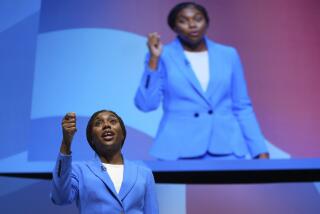Thatcher Heir Elected : Treasury Chief John Major to Be Next Prime Minister
- Share via
LONDON — John Major, who was endorsed by Prime Minister Margaret Thatcher as her successor and heir, was elected today as leader of the Conservative Party and will become prime minister.
Major fell two votes short of the needed majority, but his opponents conceded defeat and Conservative Party officials declared him elected.
Aides said Thatcher is “thrilled.” Major, 47, her chancellor of the Exchequer, is the youngest person to be elected Britain’s prime minister since the 19th Century.
“It is a very exciting thing to become leader of the Conservative Party, and particularly exciting, I think, to follow one of the most remarkable leaders the Conservative Party has ever had,” Major said.
He called Thatcher “a very great prime minister indeed.”
Thatcher has made no public comment on what she will do next. She could continue to represent Finchley in the House of Commons, enter the House of Lords, write her memoirs or enter business.
“Our job now I think is quite clear. We are going to unite totally and absolutely and we’re going to win the next general election,” said Major, who emerged smiling from his residence at 11 Downing St.
Major won 185 votes, former Defense Secretary Michael Heseltine had 131 votes and Foreign Secretary Douglas Hurd had 56 votes in a secret ballot election among Tory members of Parliament.
“I congratulate John Major and thank him for a first-class campaign, fought without rancor or bitterness, which I believe lays the basis for the unity of our party,” Heseltine said moments after the vote was announced.
Hurd also quickly conceded.
Within minutes, Cranley Onslow, chairman of the Conservative Party committee that supervised the election, announced that another ballot was not required and that Major was elected.
Thatcher left her residence at 10 Downing Street to congratulate Major, who as chancellor of the Exchequer is her next-door neighbor at No. 11.
Queen Elizabeth II will send for Major and ask him to form a Cabinet after Thatcher has handed in her seals of office at Buckingham Palace on Wednesday morning.
Major was elected to Parliament in 1979, was appointed foreign secretary and then chancellor of the Exchequer last year.
He attracted support from prominent figures on the right wing of the Conservative Party, although his friends insisted that Major’s own views are more liberal than many supposed.
He described himself as conservative on economic issues but liberal on social issues.
Major epitomized the self-reliant, hard-working achiever whom Thatcher encouraged. Born March 29, 1943, the son of a circus performer, he left school at 16 and was a laborer and at one time a welfare recipient.
Major became a banker and a Conservative Party activist and was elected to Parliament in the first Thatcher victory of 1979. He was appointed to a junior ministerial post in 1985, then to the No. 2 position at the Exchequer in 1987.
He emerged as a possible heir-apparent when Thatcher appointed him foreign secretary in July, 1989, and then chancellor of the Exchequer three months later.
More to Read
Sign up for Essential California
The most important California stories and recommendations in your inbox every morning.
You may occasionally receive promotional content from the Los Angeles Times.













